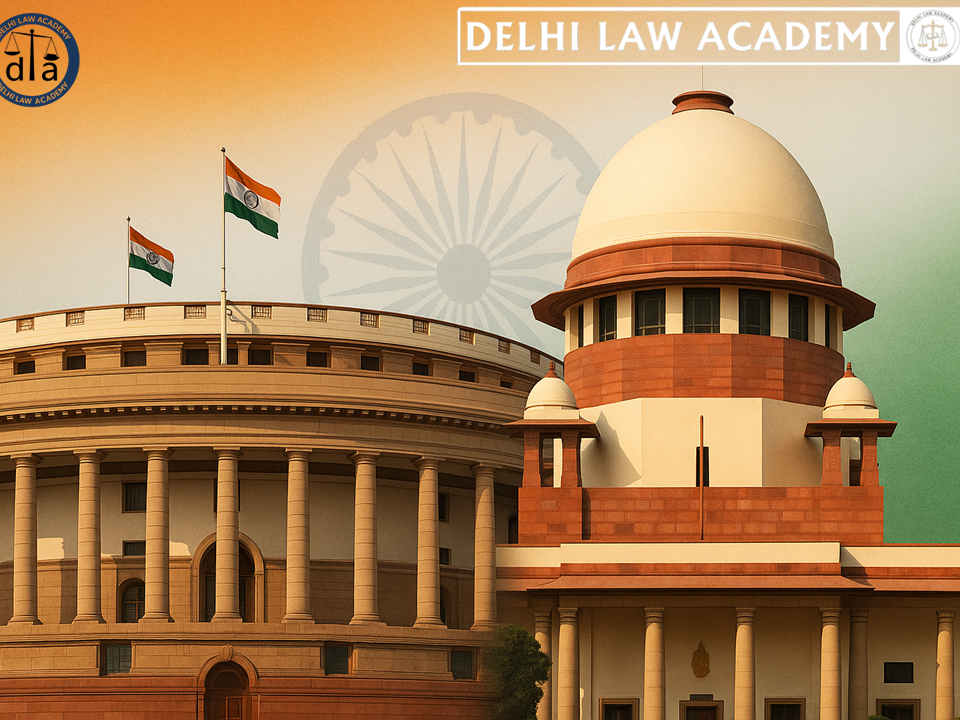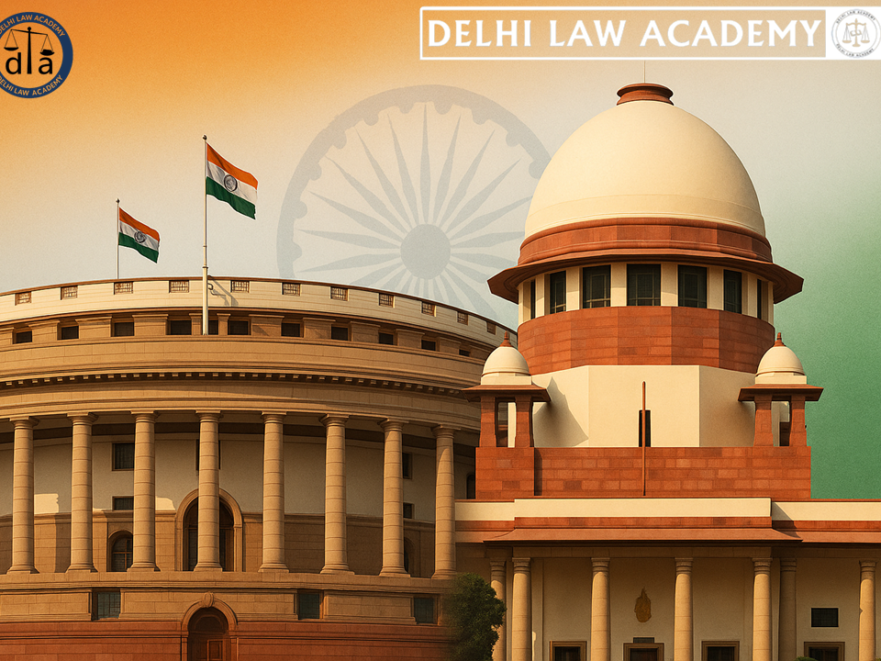
📜 Constitution 129th Amendment Bill 2024 – One Nation One Election
Topic: Constitution 129th Amendment Bill 2024
Simultaneous elections to the House of People and all Legislative Assemblies
🇮🇳 ONE NATION ONE ELECTION
✨ Salient Features of the Bill
🗳️ Power to hold simultaneous elections
The Constitution (129th Amendment) Bill, 2024 empowers the Election Commission to conduct elections for Lok Sabha and all State Assemblies together (referred to as simultaneous elections). The Union Territories Laws (Amendment) Bill, 2024 extends this framework to Union Territory (UT) Assemblies.
📅 Commencement of simultaneous elections
To bring the provisions of the Constitution Amendment Bill into force, the President may issue a notification on the date of the first sitting of Lok Sabha after a general election. The terms of all State and Union Territory Assemblies constituted after the date of the notification will expire with the expiry of the full term of Lok Sabha. Hence, elections to Lok Sabha and all State and UT Assemblies thereafter will be conducted together.
⚡ Premature dissolution of Lok Sabha or Assemblies
If Lok Sabha or a State/UT Assembly is dissolved sooner than its full term of five years, a fresh election will be held for a term equal to the remainder of the five-year term. This will synchronise elections for Lok Sabha and all Assemblies every five years.
⏳ Deferring a state election
The Constitution Amendment Bill provides that if the Election Commission is of the opinion that the election for a particular State Assembly cannot be held as part of the simultaneous elections, it may make a recommendation to the President in this regard. Thereafter, the President may issue an order to conduct election for that State Assembly at a later date. Where the election to a State Assembly is deferred to a date after the simultaneous election, its term will end with the end of Lok Sabha constituted in that simultaneous election. The UT Laws Amendment Bill does not have such provisions.
📖 Actual Provisions of the Bill
1️⃣ New Article 82A: Simultaneous elections to the House of the People and all Legislative Assemblies
(2) Notwithstanding anything in article 83 and article 172, the term of all Legislative Assemblies constituted in any general election held after the appointed date and before the expiry of the full term of the House of the People shall come to an end on the expiry of the full term of the House of the People.
(3) Notwithstanding anything in this Constitution or any law for the time being in force, and before the expiry of the full term of the House of the People, the Election Commission shall conduct general elections to the House of the People and all Legislative Assemblies simultaneously and the provisions of Part XV shall apply to these elections mutatis mutandis with such modifications as may, become necessary and which the Election Commission may, by order, specify.
(4) The expression “simultaneous elections” shall mean general elections held for constituting the House of the People and all the Legislative Assemblies together.
(5) If the Election Commission is of the opinion that the elections to any Legislative Assembly cannot be conducted along with the general election to the House of the People, it may make a recommendation to the President, to declare by an order, that the election to that Legislative Assembly may be conducted at a later date.
(6) Where the elections to a Legislative Assembly is deferred under clause (5), then, notwithstanding anything in article 172, the full term of the Legislative Assembly shall end on same date as the end of the full term of the House of the People constituted in the general election.
(7) The Election Commission shall at the time of notifying the election to a Legislative Assembly under this article declare the date on which the full term of the Legislative Assembly shall come to an end.’
2️⃣ New clauses in Article 83
(4) Where the House of the People is dissolved sooner than the expiry of its full term, the period between its date of dissolution and five years from the date of the first meeting shall be referred to as its unexpired term.
(5) Notwithstanding anything in clause (2), where the House of the People is dissolved sooner than the expiry of its full term, the new House of the People constituted pursuant to elections occasioned by such dissolution, unless sooner dissolved, shall continue for such period as is equal to the unexpired term of the immediately preceding House of the People and expiration of this period shall operate as a dissolution of the House.
(6) The House of the People constituted under clause (5) shall not be a continuation of the previous House of the People and all the consequences of dissolution shall apply to the House of the People referred to in clause (4).
(7) The election for constituting the House of the People for its unexpired term shall be referred to as a mid-term election, and the election held after the expiry of the full term shall be referred to as the general election.
📜 Part 2: Key Provisions and Statement of Objects
3. New clauses in Article 172
“(3) Where the State Legislative Assembly is dissolved sooner than the expiry of its full term, the period between its date of dissolution and five years from the date of the first meeting shall be referred to as its unexpired term.
(4) Notwithstanding anything in clause (1), where the State Legislative Assembly is dissolved sooner than the expiry of its full term, and a new State Legislative Assembly is constituted pursuant to elections occasioned by such dissolution, then, such new State Legislative Assembly, unless sooner dissolved, shall continue for such period as is equal to the unexpired term of the immediately preceding State Legislative Assembly and the expiration of this period shall operate as a dissolution of the Assembly.
(5) The State Legislative Assembly constituted under clause (4) shall not be a continuation of the previous State Legislative Assembly and all the consequences of dissolution shall apply to the State Legislative Assembly referred to in clause (3).”
4. Amendment in Article 327
🖊 In article 327, words “conduct of simultaneous elections” shall be inserted after the words “delimitation of constituencies”.
📌 Statement of Objects and Reasons
⚖️ 2. There is an imperative need for holding of simultaneous elections for various reasons and given that elections have become expensive and time consuming. The imposition of Model Code of Conduct in several parts of the country which are poll bound put on hold the entire development programmes, cause disruption of normal public life, impact the functioning of services and also curtail the involvement of manpower from their core activities for deployment for prolonged periods for election duties.
⚖️ 3. The High Level Committee under the Chairmanship of Shri Ram Nath Kovind, former President of India was constituted on 2nd September, 2023 to examine the issue of simultaneous elections and make recommendations for holding simultaneous elections in the country. …The Government has accepted the recommendations of the High Level Committee.
⚖️ 5. The Bill proposes to insert a new article 82A (Simultaneous elections to the House of the People and all Legislative Assemblies) and to amend article 83 (Duration of Houses of Parliament), article 172 (Duration of State Legislatures) and article 327 (Power of Parliament to make provision with respect to elections to Legislatures).
⚖️ 6. The aforesaid Bill, inter alia, provides that after its enactment, a notification is to be issued by the President on the date of the first sitting of the House of the People after a general election, and that date of the notification shall be called the appointed date. The tenure of the House of the People shall be five years from that appointed date. The tenure of all Legislative Assemblies, constituted by elections to the Legislative Assemblies after the appointed date and before the expiry of the full term of the House of the People, shall come to an end on the expiry of the full term of the House of the People. Thereafter, all general elections to the House of the People and all Legislative Assemblies shall be held together simultaneously. In case of dissolution of the House of the People or a Legislative Assembly, sooner than the full term of the House of the People or the Legislative Assembly, the term of the House or Assembly constituted pursuant to elections shall be for the unexpired term of the House or the Assembly.
📚 Further Reading for Law Aspirants
Explore more useful resources from Delhi Law Academy to strengthen your preparation:
❓ Frequently Asked Questions (FAQs) on Constitution 129th Amendment Bill 2024
📌 What is the main objective of the Constitution 129th Amendment Bill 2024?
The Bill aims to enable simultaneous elections for the Lok Sabha and all State Legislative Assemblies, ensuring a “One Nation One Election” framework for efficiency, reduced costs, and governance stability.
🗳️ How will simultaneous elections be conducted under this Bill?
The Election Commission will conduct Lok Sabha and State Assembly elections together after the President issues a notification. Terms of Assemblies will align with the term of the Lok Sabha.
⚖️ What happens if the Lok Sabha or a State Assembly is dissolved early?
In case of premature dissolution, fresh elections will be held, but only for the remaining unexpired term of five years. This ensures synchronization of all elections in the next cycle.
👩⚖️ What is Article 82A introduced by the 129th Amendment Bill?
Article 82A is a new constitutional provision mandating simultaneous elections to the House of People and all Legislative Assemblies. It defines procedures, timelines, and presidential powers for such elections.
📅 When were simultaneous elections last held in India?
Simultaneous elections were held in 1951-52, 1957, 1962, and 1967. The cycle broke in 1968–69 due to premature dissolutions of some Assemblies.
💰 How will simultaneous elections benefit India?
They reduce election expenditure, governance disruptions, and repeated imposition of Model Code of Conduct, while allowing governments to focus on long-term development without frequent election cycles.
Contact us
📍 Delhi Law Academy – Jaipur Branch
6C, Tower 2, Coaching Hub, Pratap Nagar, Jaipur – 302033
📞 Phone:
+91 9911916552
+91 8447285606
✉️ Email:
contactus@delhilawacademy.com

